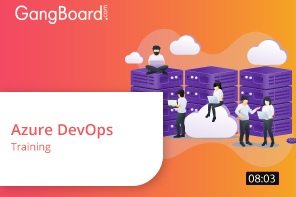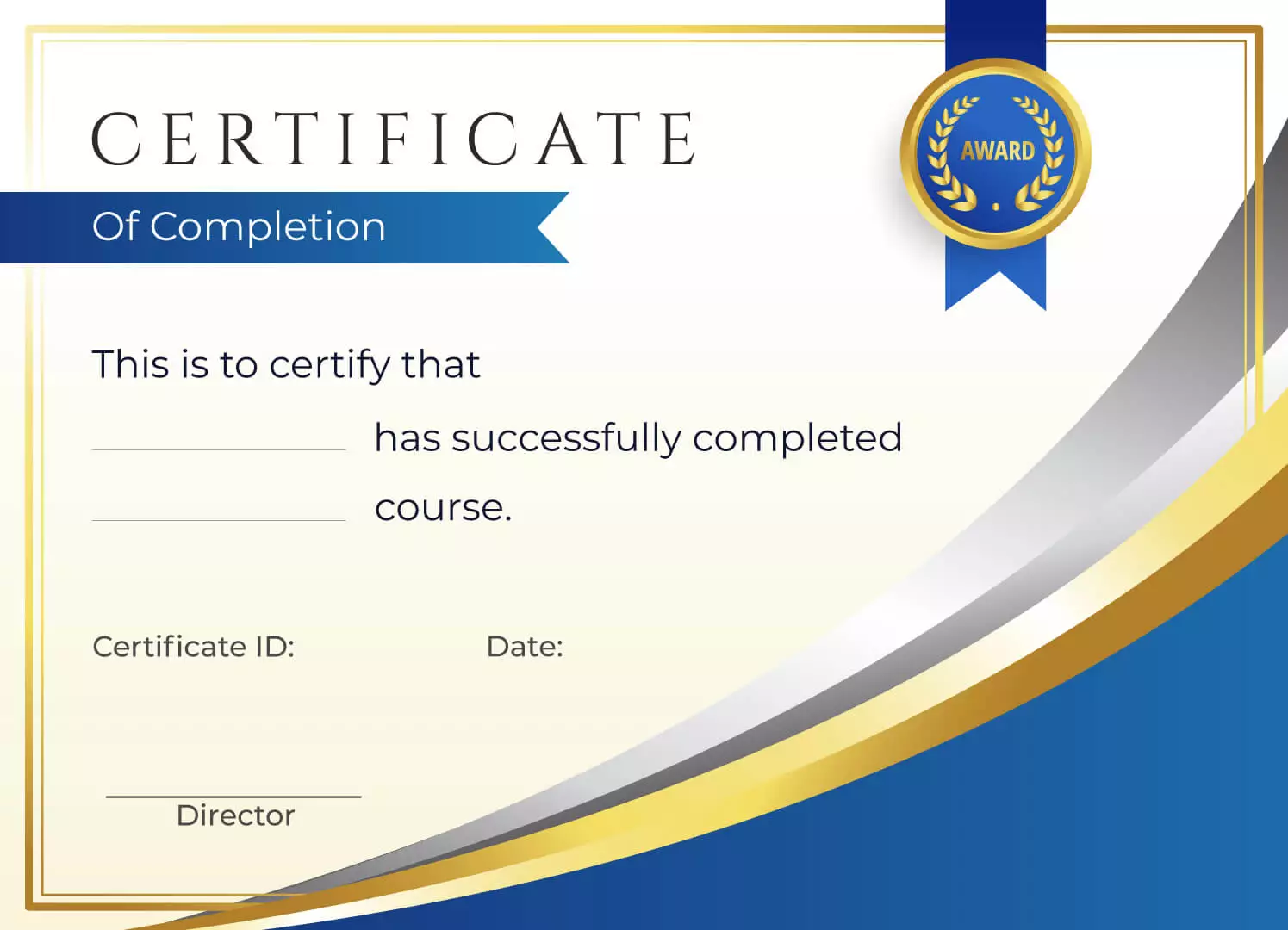Azure DevOps Certification Online Training
GangBoard has brought its valuable Azure with DevOps Online Certification Training for the aspirants at very pocket-friendly prices. The candidates can easily pass out the Azure with DevOps Training certification exam after the successful completion of the Online Azure DevOps Course from GangBoard. All our trainers are certified and have years of experience working in their respective industries. During this course, the candidates would cover both the Azure and DevOps concepts. Upon the successful completion of this course, the candidates are offered average salaries of $145,000 and $185,000 p.a. So, if you are planning to pursue your career as an Azure DevOps Engineer then come to us.
The Azure DevOps Training Course of GangBoard is developed by industry experts. We have curated this detailed Training and certification course to help aspirants to develop prominent Azure and DevOps skills. In this live training course, you will learn cloud architecture, Virtual Network Connectivity, Azure administration, and other aspects associated with it. We have also included live case projects in the certification training so that every candidate can receive hands-on experience with this technology. One can easily gain expertise in the precepts of both DevOps and Azure. There is a denial in the fact that this job-oriented training comes up with a big list of benefits. So, grow your career by enrolling yourself with us.
What you'll learn from this course?
- Module I – Create and Manage Azure Resource Manager Virtual Machines
- Module II – Design and Implement a Storage Strategy
- Module III – Implement Virtual Networks
- Module IV – Design and Deploy ARM Templates
- Module V – Manage Azure Security and Recovery Services
- Module VI – Manage Azure Operations
- Module VII – Manage Azure Identities
- DevOps Training Syllabus
- Introduction and Course Agenda
- Concepts
- Provisioning
- Automation and Configuration Management
- Continuous Integration
- Deployments
- Continuous Monitoring
- Containerization
Upcoming Batches for Azure DevOps Training
Our Azure DevOps Online Course give students the opportunity to take classes on your flexible timings. Choose from a number of batches as per your convenience. If you got something urgent to do, reschedule your batch for a later time. The classes can be attended to at any place and at any time as per your choice.
Course Price at
Discount Price:₹ 25,000You Save: ₹ 5,000 (16.7% OFF)
Can’t find a batch you were looking for?
Enroll Now Pay Later Request a BatchCourse Syllabus of Azure DevOps Online Training
Azure Training Syllabus
Module I – Create and Manage Azure Resource Manager Virtual Machines
Implementing Microsoft Azure Infrastructure Solutions
- Deploy workloads on Azure Resource Manager (ARM) virtual machines (VMs)
- Identify workloads that can and cannot be deployed run workloads that use Microsoft or Linux operating systems;
- Create VMs; connect to a Windows/Linux VM;
- Deploy workloads; deploy Bring Your Own License (BYOL) images
Perform configuration management
- Automate configuration management by using PowerShell Desired State Configuration (DSC) and VM Agent (custom script extensions);
- Enable remote debugging
Design and implement VM storage
- Configure disk caching & plan storage capacity.
- Configure operating system disk redundancy.
- Configure shared storage using Azure File service & Azure File Share snapshots.
- Configure geo-replication. Encrypt disk.
- Implement ARM VMs with Standard and Premium Storage.
- Configure Blob-Level Tiering (Hot, Cool, Archive). Manage storage encryption keys
Monitor ARM VMs
- Configure ARM VM monitoring; configure alerts.
- Configure diagnostic and monitoring storage location
- Manage ARM VM availability
- Configure multiple ARM VMs in an availability set for redundancy.
- Configure each application tier into separate availability sets.
- Combine the Load Balancer with availability sets.
- Configure fault domains and update domains.
- Leverage Availability Zones
Scale ARM VMs
- Scale up and scale down VM sizes.
- Deploy ARM VM Scale Sets (VMSS).
- Configure ARM VMSS auto-scale.
Lab 1:
- Create ARM VM & scale Set.
- Create availability set and associate with VM.
Module II – Design and Implement a Storage Strategy
Implement Azure Storage blobs and Azure Files
- Identify appropriate blob type for specific storage requirements.
- Read data, change data ,set metadata on a container.
- Store data using block and page blobs & stream data using blobs.
- Access blobs securely & implement async blob copy.
- Configure Content Delivery Network (CDN).
- Design blob hierarchies; configure custom domains.
- Scale blob storage; manage SMB file storage; implement Azure StorSimple
Manage access
- Create and manage shared access signatures.
- Use stored access policies & regenerate keys.
- Encrypt keys by using Azure Key Vault integration
Configure diagnostics, monitoring and analytics
- Set retention policies and logging levels; access, add, and remove logs; analyze logs
Implement storage encryption
- Encrypt data as written to Azure Storage by using Azure Storage Service Encryption (SSE).
- Implement encrypted and role-based security for data managed by Azure Data Lake Store.
Lab 2
- Created Azure Storage account.
- Install and browse storage account using Storage Explorer.
- Upload file to Azure Blob Storage using command line & Storage explorer.
- Created and mount Azure File share in windows & Linux Servers.
- Access a storage account with Share access signature.
Module III – Implement Virtual Networks
- Configure virtual networks
- Deploy a VM into a virtual network.
- Configure external and internal load balancing.
- Implement Application Gateway & design subnets.
- Configure static, public, and private IP addresses.
- Set up Network Security Groups (NSGs), DNS at the virtual network level, HTTP and TCP health probes, public IPs, User Defined Routes (UDRs), firewall rules, and direct server return.
- Connect VNets by virtual network peering.
Design and implement multi-site or hybrid network connectivity
- Choose the appropriate solution between Azure ExpressRoute, site-to-site, and point-to-site.
- Choose the appropriate gateway.
- Identify supported devices and software VPN solutions.
- Identify networking prerequisites, configure virtual networks and multi-site virtual networks.
- Implement virtual network peering and service chaining.
- Implement hybrid connections to access on-premises data sources, leverage S2S VPNs to connect to on-premises infrastructure.
- Monitor ExpressRoute.
Configure ARM VM networking
- Configure static IP addresses, Network Security Groups (NSGs), DNS, User Defined Routes (UDRs), external and internal load balancing with HTTP and TCP health probes, public IPs, firewall rules, and direct server return.
- Design and implement Application Gateway.
- Configure Accelerated Networking.
- Configure virtual network service endpoints.
Design and implement a connection strategy
Implement Hybrid Connections to access data sources on-premises; leverage S2S VPN to connect to an on-premises infrastructure
Lab 3
- Create VNet and Subnets.
- Configured VNet Peering between the virtual networks.
- Configure Site to Site VPN between different azure region using Azure VPN Gateway.
- Configure Point to Site VPNN to access the Azure resources from public client machine.
Module IV – Design and Deploy ARM Templates
- Implement ARM templates
- Author ARM templates.
- Create ARM templates to deploy multiple ARM Resource Providers resources of different types with count loops and Marketplace items.
- Deploy templates with PowerShell, Azure CLI, Azure Portal and REST API
Control access
- Leverage service principals with ARM authentication.
- Use Azure Active Directory Authentication with ARM.
- Set management policies.
- Configure lock policies.
- lock resources.
Design role-based access control (RBAC)
- Secure resource scopes such as the ability to create VMs and Azure Web Apps.
- Implement Azure RBAC standard roles.
- Design Azure RBAC custom roles.
Lab 4
- Deploy Azure ARM resources using ARM template.
- Create and modify the resource using the visual studio ARM templates.
- Implement the RBAC and control the users access.
Module V – Manage Azure Security and Recovery Services
Manage data protection and security compliance
- Create and import encryption keys with Key Vault.
- Automate tasks for SSL/TLS certificates.
- Prevent and respond to security threats with Azure Security Center.
- Configure single sign-on with SaaS applications using federation and password based authentication.
- Add users and groups to applications.
- Revoke access to SaaS applications.
- Configure access.
- Configure federation with public consumer identity providers such as Facebook and Google.
Implement recovery services
- Create a backup vault.
- Deploy a backup agent; backup and restore data, use snapshots and Geo-replication for recovery.
- Implement DR as service.
- Deploy Azure Site Recovery (ASR) agent, configure ASR; configure ASR one-click failover
Lab 5
- Azure Security center configuration and manage policies.
- Created ASR Vault and configured Backup for VM.
- Restore VM or files using ASR Vault.
Module VI – Manage Azure Operations
Enhance cloud management with automation
- Implement PowerShell runbooks.
- Integrate Azure Automation with Web Apps.
- Create and manage PowerShell Desired State Configurations (DSC).
- Import DSC resources; generate DSC node configurations; monitor and automatically update machine configurations with Azure Automation DSC.
- Implement serverless computing, including Azure Functions, Event Grid, and Service Bus
Collect and analyze data generated by resources in cloud and on-premises environments
- Collect and search across data sources from multiple systems.
- Build custom visualisations.
- Visualize Azure resources across multiple subscriptions.
- Transform Azure activity data and managed resource data into an insight with flexible search queries; monitor system updates and malware status.
- Track server configuration changes by using Azure Log Analytics.
- Configure the IT Service Management Connector (ITSMC).
Lab 6
- Create Azure Automation Account & run the custom PowerShell script through the account.
- Create Azure Log Analytics to explore the “Azure Migrate”.
- PowerShell DSC implementation.
Module VII – Manage Azure Identities
Monitor on-premises identity infrastructure and synchronization services with Azure AD Connect Health
- Monitor AD FS proxy and web application proxy servers.
- Setup email notifications for critical alerts.
- Generate utilization report.
- Monitor Sync Engine.
- Monitor domain controllers & monitor replication
Manage domains with Azure Active Directory Domain Services
- Join Azure virtual machines to a domain, securely administer domain-joined virtual machines by using Group Policy.
- Migrate on-premises apps to Azure.
- Handle traditional directory-aware apps along with SaaS apps
Integrate with Azure Active Directory (Azure AD)
- Implement Azure AD Connect and single sign-on with on-premises Windows Server 2016.
- Add custom domains.
- Monitor Azure AD.
- Configure MFA.
- Configure Windows 10 with Azure AD join.
- Implement Enterprise State Roaming, implement Azure AD integration in web and desktop applications.
- leverage Microsoft Graph API.
- Implement Azure Managed Service Identity; implement Privileged Identity Management, implement Azure AD Identity Management, enable self-service password reset.
Lab 7
- Create & Manage users in Azure Active Directory.
- Install Azure AD connect on on-premise Active directory.
- Integrate on-Premise AD to Azure AD.
- Manage Azure AD users and Roles.
DevOps Training Syllabus
Introduction and Course Agenda
- Introduction to the DevOps Course
Concepts
- What is DevOps
- DevOps: Continuous Delivery and Benefits
- DevOps: Lean thinking, a change of culture
- Version Control (GIT)
- Git Commands Overview
- Demo: GIT commands and GitHub
Provisioning
- Introduction to Provisioning
- Vagrant
Automation and Configuration Management
- Introduction to Automation and Configuration Management
- Ansible: introduction
- Ansible: Installation
- Ansible: Installation demo
- Ansible: First Playbook
- Ansible: First Playbook demo
- Ansible: Provisioning with vagrant and EC2
- Ansible: Roles
Continuous Integration
- Introduction to Continuous Integration
- Jenkins: Introduction and installation
- Jenkins: Prepare Play App
- Jenkins: Build an app
- Jenkins: building applications with sbt or maven
- Jenkins: install and build a demo
Deployments
- Deployment Introduction
- Artifact storage and deployment
- Artifact storage and deployment demo
Continuous Monitoring
- Continuous Monitoring
Containerization
- Introduction to microservices
- Introduction to docker
- Docker demo
- Docker Architecture
- Docker Images
- Docker Networking
- Docker Volumes.
Are you Looking for Customized Syllabus
We are also providing customized syllabus to the students according to their needs and projects requirements for the cons
Request a CallProgram Features
IT Professionals as Trainers
Learning a technology with a professional who is well expertise in that solve 60% of your needs.
Fully Hands-on Training
We support any training should be more practical apart from theoretical classes. So, we always gives you hands-on training.
Affordable Fees
We are dead cheap in fees. We are having options to make the payment in instalments as well if needed.
10000+ old students to believe
We satisfied 10000+ students from the day we started GangBoard. Take a look of our old student’s video reviews and it says all.
Counselling by Experts
If you are in dilemma to choose a course, we are having experts in counselling team to help you with perfect projection of your career.
Own Course Materials
We have every course material to understand which is prepared by our trainers and we will share with you after session completes.
FAQ
Request more information
Our Advisor will get in touch with you in the next 24 Hours
Azure DevOps Exams & Certification
GangBoard Certification is Accredited by all major Global Companies around the world. We provide after completion of the theoretical and practical sessions to fresher’s as well as corporate trainees.
Our certification at GangBoard is accredited worldwide. It increases the value of your resume and you can attain leading job posts with the help of this certification in leading MNC’s of the world. The certification is only provided after successful completion of our training and practical based projects.
5000
Total Number of Reviews
4.57
Aggregate Review Score
97%
Course Completion Rate
At End of our Azure DevOps Online Course, you will be assigned to work real-time projects. Once you completed the project with expected results we will verify and issue a globally recognised Azure DevOps Course Completion Certificate from GangBoard.
Azure DevOps Training Reviews
Average Ratings
Activity from April 2018
4.8
Course Reviews
Activity from Last Year
1596 ReviewsAverage Ratings
GangBoard Total Reviews in all Medium
21,596 ReviewsFiyaz
Software Engineer
GangBoard is the best place for learning software IT Courses. They provide unique course materials, a curriculum plan and well-trained instructors along with 24/7 support. The course content prepared GangBoard is extremely inline with real-time client specifications. Thanks to the whole GangBoard team.
Jeevika
Software Engineer
I had an Amazing Learning Experience from GangBoard. I am very much thankful to my trainer for explaining in a great way and developing my interest further in this topic. It's really a great opportunity for me to take Training in GangBoard. Thanks to the entire team of GangBoard.
Lohit
Software Engineer
I have done Training in GangBoard. It's really an awesome learning experience. All the concepts were covered without any compromise. The instructor was very well determined and Focussed on Clear Examples. It's completely awesome. Thanks to GangBoard.
Aalia
Software Engineer
Thanks to GangBoard for providing excellent Software IT Courses. I would like to say thanks to the support team for there advice and help whenever I faced any issues. They are always ready to help you to solve the issues. I like this approach from GangBoard.
Nisha
Software Engineer
I took Training with GangBoard. It is an amazing experience. Excellent course structure, Experienced faculty, superb support team. They are always with the success of student carrier, very prompt service they are committed to what they promised.











 +1 201-949-7520
+1 201-949-7520 +91-9707 240 250
+91-9707 240 250